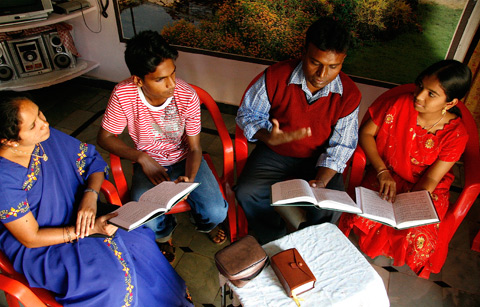
“Each family organization should include a family council comprised of all members of the family unit,” Elder L. Tom Perry of the Quorum of the Twelve Apostles says. “Here the basic responsibilities of the family organization can be taught to the children. They can learn how to make decisions and act upon those decisions.”
Elder Perry also noted that every family has different needs. Some are students trying to study and raise a family at the same time, some are older and no longer have children at home, some are single parents, and some are individuals living alone. “Each has different needs, and these needs are changing every year,” he said. However, “there is still need to organize time and thought to establish goals for meeting needs.”
What Is a Family Council?
Elder M. Russell Ballard of the Quorum of the Twelve Apostles adds this clarification of what a family council should be: "I think of the traditional definition that says a family council is a time when a father and mother sit down and go through a list of dos and don’ts with their children,” he says. “I was never able to make it work that way. I found that when the list came out, it turned the children off. So I tried bringing up a specific problem—such as the garden needs weeding—and then simply asked the family, ‘What can we do about it? What are your ideas?’”
“A council is when parents let their children help solve the problem. And when everyone agrees to a solution, everyone will have ownership of the problem. If I tell the family, ‘You go out and pull the weeds,’ there may be complaining or hurt feelings. But if I can help them to feel, ‘We all decided this,’ then the family council is truly working. Before you know it, family members will be organizing themselves, saying, ‘You do this and I’ll do that.’ That’s the power of a council.”
“Whenever there are two or more members of a family together and a discussion is going on, that is a council!” says Elder Ballard. “Family councils can be held in one-on-one talks between a parent and a child or among parents and several children. When a husband and wife talk to each other, they are holding a family council.”
Budgeting Together
“Another important way we help our children learn to be provident providers is by establishing a family budget,” says Elder Robert D. Hales of the Quorum of the Twelve Apostles. “We should regularly review our family income, savings, and spending plan in family council meetings. This will teach our children to recognize the difference between wants and needs and to plan ahead for meaningful use of family resources.”
“When our boys were young, we had a family council and set a goal to take a ‘dream vacation’ down the Colorado River. When any of us wanted to buy something during the next year, we would ask each other, ‘Do we really want to buy that thing now, or do we want to take our dream trip later?’ This was a wonderful teaching experience in choosing provident living. By not satisfying our every immediate want, we obtained the more desirable reward of family togetherness and fond memories for years to come.”
Achieving Desired Outcomes
“Whoever is in charge of a council needs to have some idea of a desired outcome—perhaps a change in behavior—before discussion starts,” says Elder Ballard. “Then both parents need to work with the children until things change for the better.”
“Parents need to draw the children into the problem-solving process by letting them be heard,” Elder Ballard says. “For example, I came home at times to find that the children had not cleaned their rooms or done other things they were supposed to do. My wife had her hands full with seven children to raise. So I called the children together for a short council meeting. We talked about what needed to be done and decided on a course of action. Talking about the course of action makes all the difference. If it’s mandated or dictated, there will usually be resistance. But if parents will establish a climate conducive to openness, where every person is important and every opinion is valued, they can create a kind of spiritual synergism in the home, where the combined action or cooperation that results is greater than the sum of the individual parts.”
